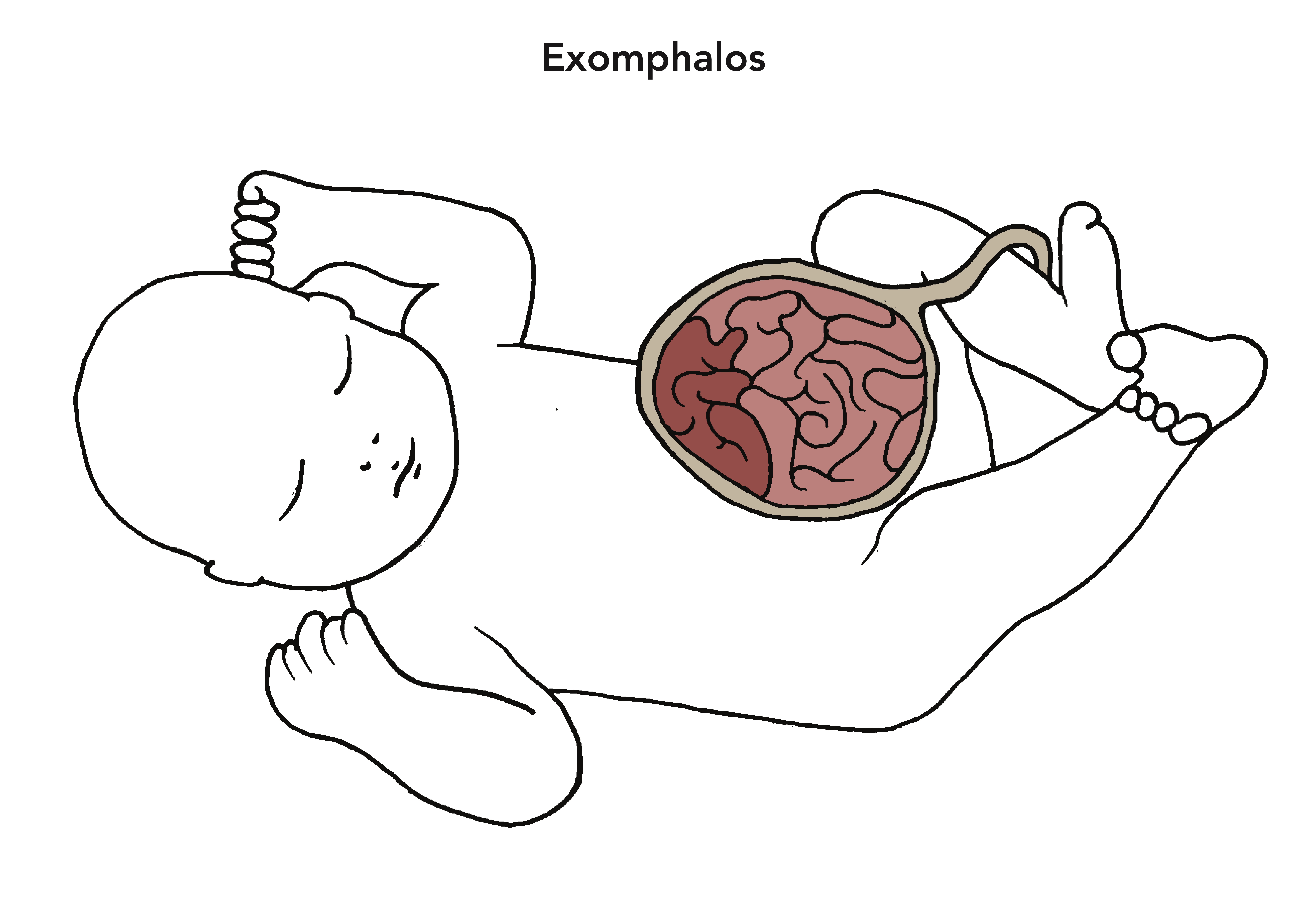Exomphalos
Exomphalos
What is exomphalos?
Exomphalos is a type of abdominal wall defect. As all babies form, their bowel develops inside the umbilical cord early in pregnancy. In most pregnancies, the bowel moves back into the baby’s tummy (abdomen). However, in exomphalos, the bowel remains inside the umbilical cord. Sometimes, other organs such as the liver may also be present. Exomphalos is also sometimes called omphalocele.

What causes exomphalos?
Exomphalos is a rare condition. Unfortunately, we do not know what causes it. It is not caused by something you have or have not done. Over half of babies with exomphalos may have structural problems affecting another part of their body such as their heart or urinary system.
In each cell of our body, the genetic information (DNA) is packaged into 46 chromosomes. Having an incorrect number of chromosomes (e.g. in Down’s Syndrome) or a change in the DNA (a gene) on one of these chromosomes can affect the way cells work and how organs in the body form. Around one third of babies with exomphalos may have an underlying genetic problem.
How do we find exomphalos?
Most babies with exomphalos are identified at the time of the early pregnancy (dating) ultrasound scan. It is also screened for at the 20-week ultrasound scan (between 18-20+6 weeks).
If exomphalos is suspected, then you will be referred to a team of experts to help plan your care for this pregnancy (fetal medicine unit).
What tests and follow up will I be offered?
When you attend the fetal medicine unit, a specialist will ask you some questions about your pregnancy, any previous pregnancies, family history and your health. A second scan will be performed to confirm your baby has exomphalos. The specialist will also have a detailed look at the baby to look for any other structural problems. There will also be a specialist ultrasound assessment of your baby’s heart (fetal echocardiogram). The specialist will discuss with you the options for testing the genetics of baby. Depending on how many weeks pregnant you are this can be through chorionic villous sampling (CVS) or amniocentesis.
Some families may decide to not continue with the pregnancy and opt for a termination of pregnancy. This will also be discussed as an option with you.
During your pregnancy you will have regular ultrasound scans to monitor the exomphalos and baby’s growth. We will plan for you to deliver your baby at St Michael’s Hospital, Bristol so that doctors with expertise in looking after babies with exomphalos are present. We will generally recommend inducing your labour just before your due date if there are no other complications. It is safe for most women to aim for a vaginal delivery. We would only recommend a planned Caesarean section if the exomphalos was very large. .
What is the treatment for exomphalos?
A specialist baby doctor (neonatologist) will be present at the time of the delivery of your baby. The baby will be cared for in the neonatal unit (NICU) after delivery. Your baby will have a line placed in their arm or through their umbilical cord to allow blood tests to be performed and to keep your baby hydrated. A tube will be placed through your baby’s nose down to their stomach (nasogastric or NG tube). Some babies may also require some support with their breathing.
A specialist surgeon will assess your baby and discuss with you the options for treatment. When the exomphalos is small, most babies will have an operation in the first few days of life to place the bowel back inside the tummy and close the skin. If the exomphalos is large, some babies will have dressings applied and an operation when they are older (around 1 year). Others will have an earlier operation with a patch over the defect. The surgical team will discuss these options with you. Operations are performed with the baby asleep (under general anaesthetic).
Any treatments and operations will be explained to you in detail, and you will have the opportunity to ask questions.
After the operation, your baby will closely monitored in NICU or on the surgical ward. Your baby may need feeding support through the line into their vein whilst their bowel starts to work. Feeding will gradually commence with breast or bottle milk through their NG tube. As they recover, lines will be removed, and they can start feeding normally.
Follow-up
Most children with a small exomphalos and no other problems will grow up to live normal lives. The outlook for those with larger exomphalos or other structural or genetic problems can vary. Some children will need ongoing support with their feeding or breathing.
Choices and support
Having a child diagnosed with a congenital anomaly can be a scary and difficult experience. Please don’t hesitate to chat to your medical team or GP who can let you know about the support available for you and your family. Antenatal Results and Choices https://www.arc-uk.org
